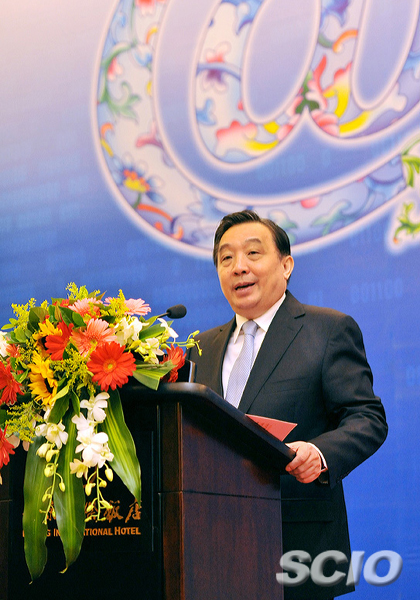4th China-UK Internet Roundtable held in Beijing
 0 Comment(s)
0 Comment(s) Print
Print E-mail
China.org.cn, September 29, 2011
E-mail
China.org.cn, September 29, 2011
 |
|
Wang Chen, minister of the State Council Information Office (SCIO), delivers a speech at the Fourth China-UK Internet Roundtable in Beijing on Sep. 29. |
The 4th China-UK Internet Roundtable was held in Beijing Thursday.
More than 100 representatives from Chinese and British government departments, renowned Internet enterprises and research institutions exchanged views on Internet security, mobile networks, digital media innovations and digital intellectual property protection at the meeting in Beijing.
Wang Chen, Minister of the State Internet Information Office and Minister of the State Council Information Office of China and Ed Vaizey MP, the UK Minister for Culture, Communications and Creative Industries addressed the roundtable summit.
In his speech, titled "Promote Internet Development and Safeguard Internet Security", Wang Chen said that "active use, scientific development, law-based administration and guaranteed security" constitute China's basic policy regarding the Internet.
The Chinese government regards the Internet as a key part of the country's infrastructure, in both economic and social terms, and also sees it as a driving force of social and economic development.
"We have always viewed widespread Internet access as an important target and we've worked hard to create both policies and a market environment conducive to sustainable Internet development," said Wang.
He continued: "We hold that the Internet must be managed according to law. We have done everything possible to improve the Internet management system which features legal regulation, administrative supervision, industrial self-discipline, technical support, public supervision and social education. At the same time, we have actively safeguarded Internet security and ensured both the healthy development and effective use of the Internet."
Wang also outlined his opinions on such subjects as innovation, intellectual property protection, social networks, social responsibilities, Internet security and International cooperation.
Wang commented that the Internet is the result of technological innovations, and that as innovations also drive Internet development, its future lies in innovations. "We support and encourage the development of Internet applications that can promote economic and social development and facilitate people's daily work and life. We advocate the provision of Internet information services featuring diverse forms and rich content. We also support the development of a healthy Internet culture so as to meet the people's diverse, multi-level demand for information," Wang said.
The Chinese government has always regarded the protection of Internet intellectual properties as an important aspect of healthy Internet development, and has made tangible progress in this respect, which has been widely recognized by the international community. Wang commented that the Chinese government regards the protection of digital intellectual properties as a long-term task and that it will actively work to create favorable social and market environments for the protection of digital intellectual properties.
Speaking about the rise of social networks, Wang touched on the opportunities they bring and the challenges they pose. "Globally, more and more people share information via social networks. This has brought both conveniences to people and posed new challenges for social management. The violent social disorder that occurred in some parts of the world this year has stimulated discussion about how we can prevent the abuse of social networks.
"We support the rational use of new Internet technologies. By seeking advantages and avoiding disadvantages, more new technologies can be used to promote social development and progress," Wang said.
Wang also stated that the Internet enables citizens to exercise their right to know, right to participate, right to express and right to supervise. Furthermore, he commented that it also helped the government to become aware of public opinion and therefore meet people's demands and safeguard their interests.
"Chinese citizens have voiced their opinions over the Internet in various forms, and the new Internet applications and services have provided a broad platform for them to interact and exchange views.
"At the same time, the combinations of virtual society and real society and online-offline interactions have increased the influence that the Internet has on society and the general public," said Wang. He added that it is imperative to emphasize social responsibility in order to maintain the normal order of Internet information transmission.
Discussing network security, Wang emphasized that safeguarding network security protects not only the security of a particular country but also the common security of the international community.
He asserted that China opposes all forms of cyber crime, along with the cyberspace arms race: "Like other countries, China also faces an increasingly grave network security situation," he said.
Due to the vulnerability of China's Internet, network hacking from abroad has become an increasingly serious issue and has resulted in huge losses, according to Wang. "China has become one of the world's main victims of network hacking," he commented.
As China and other developing countries now face graver network security challenges than developed countries, Wang called on developed countries to help developing countries in safeguarding network security.
Wang also stressed that international cooperation between countries is essential in order to face the growing challenges posed by network security. He added that such cooperation should respect the principles of full equality, mutual respect, mutual help and mutual benefits, and refrain from using "network freedom" to seek "network hegemony".






Go to Forum >>0 Comment(s)